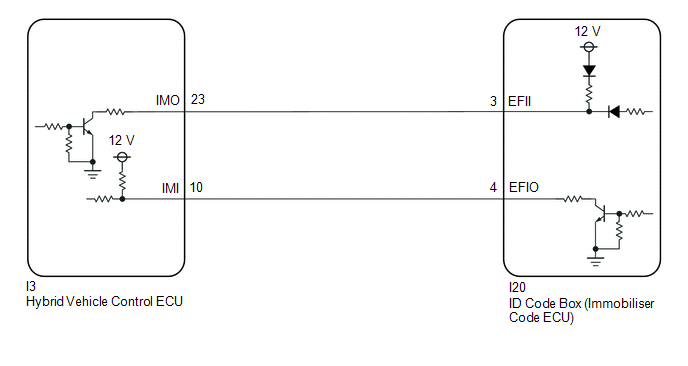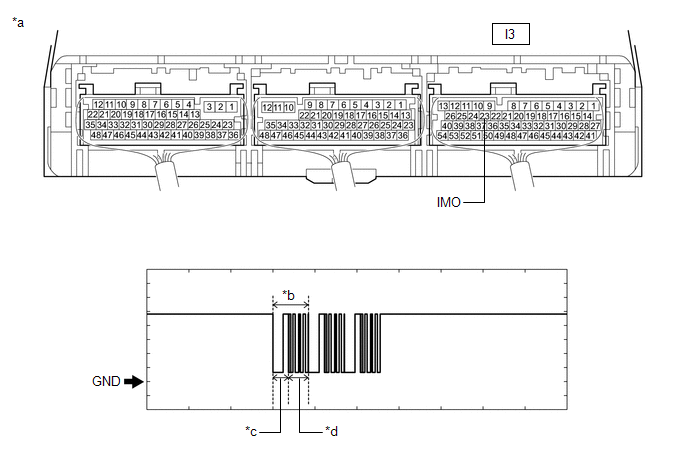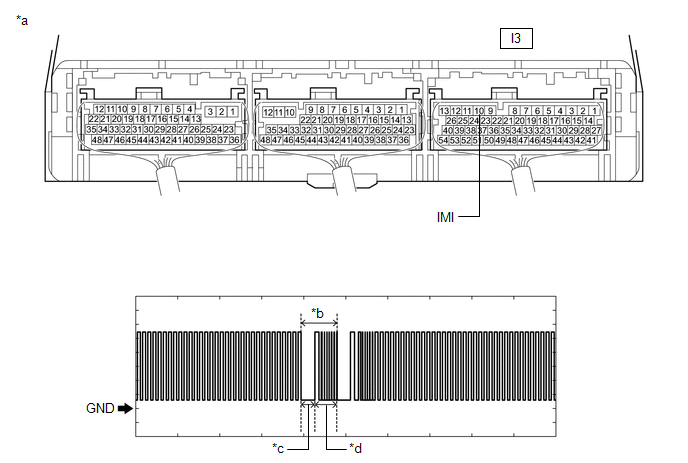| Last Modified: 05-13-2024 | 6.11:8.1.0 | Doc ID: RM100000001H8DO |
| Model Year Start: 2020 | Model: Corolla | Prod Date Range: [01/2019 - 09/2022] |
| Title: THEFT DETERRENT / KEYLESS ENTRY: SMART KEY SYSTEM (for Start Function, HV Model): B279986; Engine Immobiliser System Signal (Some Circuit Quantity, Reported via Serial Data) Invalid; 2020 - 2022 MY Corolla Corolla HV [01/2019 - 09/2022] | ||
|
DTC |
B279986 |
Engine Immobiliser System Signal (Some Circuit Quantity, Reported via Serial Data) Invalid |
DESCRIPTION
If there is a communication malfunction between the hybrid vehicle control ECU and ID code box (immobiliser code ECU), or when the communication ID codes do not match, the hybrid vehicle control ECU stores this DTC.
|
DTC No. |
Detection Item |
DTC Detection Condition |
Trouble Area |
Note |
|---|---|---|---|---|
|
B279986 |
Engine Immobiliser System Signal (Some Circuit Quantity, Reported via Serial Data) Invalid |
Either of the following conditions is met (1 trip detection logic*):
|
|
DTC output confirmation operation (Perform either of the following):
|
- *: Only output while a malfunction is present.
Vehicle Condition and Fail-safe Operation when Malfunction Detected
|
Vehicle Condition when Malfunction Detected |
Fail-safe Operation when Malfunction Detected |
|---|---|
|
Hybrid control system cannot be started |
- |
Related Data List and Active Test
|
DTC No. |
Data List and Active Test |
|---|---|
|
B279986 |
- |
WIRING DIAGRAM

CAUTION / NOTICE / HINT
NOTICE:
- When using the Techstream with the power switch off, connect the Techstream to the DLC3 and turn a courtesy light switch on and off at intervals of 1.5 seconds or less until communication between the Techstream and the vehicle begins. Then select the vehicle type under manual mode and enter the following menus Body Electrical Smart Key. While using the Techstream, periodically turn a courtesy light switch on and off at intervals of 1.5 seconds or less to maintain communication between the Techstream and the vehicle.
- The smart key system (for Start Function) uses the LIN communication system and CAN communication system. Inspect the communication function by following How to Proceed with Troubleshooting. Troubleshoot the smart key system (for Start Function) after confirming that the communication systems are functioning properly.
- Before replacing the hybrid vehicle control ECU or ID code box (immobiliser code ECU), refer to Registration.
- After performing repairs, confirm that no DTCs are output by performing "DTC Output Confirmation Operation".
HINT:
When DTC B279986 and the certification ECU (smart key ECU assembly) DTC are output simultaneously, first perform troubleshooting for the certification ECU (smart key ECU assembly) DTC.
PROCEDURE
|
1. |
REGISTER ECU COMMUNICATION ID |
(a) Register the ECU communication ID code.
|
|
2. |
CHECK HYBRID VEHICLE CONTROL ECU (TERMINAL IMO) |
(a) Using an oscilloscope, check the waveform.

|
*a |
Component with harness connected (Hybrid Vehicle Control ECU) |
*b |
Waveform |
|
*c |
Approximately 160 ms. |
*d |
Approximately 270 ms. |
OK:
|
Tester Connection |
Condition |
Tool Setting |
Specified Condition |
|---|---|---|---|
|
I3-23 (IMO) - Body ground |
Within 3 seconds of hybrid control system start or within 3 seconds of power switch turned on (IG) after cable disconnected and reconnected to auxiliary battery |
2 V/DIV., 500 ms./DIV. |
Pulse generation (See waveform) |
|
Result |
Proceed to |
|---|---|
|
Normal waveform |
A |
|
Terminal EFII stuck low (2.4 V or less) |
B |
|
Waveform not output, or has abnormal wavelength or shape |
C |
| B |

|
| C |

|
|
|
3. |
CHECK HYBRID VEHICLE CONTROL ECU (TERMINAL IMI) |
(a) Using an oscilloscope, check the waveform.

|
*a |
Component with harness connected (Hybrid Vehicle Control ECU) |
*b |
Waveform |
|
*c |
Approximately 160 ms. |
*d |
Approximately 270 ms. |
OK:
|
Tester Connection |
Condition |
Tool Setting |
Specified Condition |
|---|---|---|---|
|
I3-10 (IMI) - Body ground |
Within 3 seconds of hybrid control system start or within 3 seconds of power switch turned on (IG) after cable disconnected and reconnected to auxiliary battery |
2 V/DIV., 500 ms./DIV. |
Pulse generation (See waveform) |
| NG |

|
|
|
4. |
REGISTER ECU COMMUNICATION ID |
(a) Register the ECU communication ID code.
|
|
5. |
CHECK WHETHER HYBRID CONTROL SYSTEM STARTS |
(a) Using an electrical key transmitter sub-assembly which is registered to the vehicle, turn the power switch on (IG).
(b) Check that the hybrid control system starts 5 seconds after the power switch turned on (IG).
OK:
Hybrid control system starts normally.
| OK |

|
END (ECU COMMUNICATION ID HAS NOT BEEN REGISTERED) |
| NG |

|
|
6. |
CHECK HARNESS AND CONNECTOR (ID CODE BOX (IMMOBILISER CODE ECU) - HYBRID VEHICLE CONTROL ECU) |
(a) Disconnect the I20 ID code box (immobiliser code ECU) connector.
(b) Disconnect the I3 hybrid vehicle control ECU connector.
(c) Measure the resistance according to the value(s) in the table below.
Standard Resistance:
|
Tester Connection |
Condition |
Specified Condition |
|---|---|---|
|
I20-4 (EFIO) - I3-10 (IMI) |
Always |
Below 1 Ω |
|
I20-4 (EFIO) or I3-10 (IMI) - Other terminals and body ground |
Always |
10 kΩ or higher |
| OK |

|
| NG |

|
REPAIR OR REPLACE HARNESS OR CONNECTOR |
|
7. |
CHECK HYBRID VEHICLE CONTROL ECU |
(a) Disconnect the I3 hybrid vehicle control ECU connector.
(b) Measure the voltage according to the value(s) in the table below.
Standard Voltage:
|
Tester Connection |
Condition |
Specified Condition |
|---|---|---|
|
I3-23 (IMO) - Body ground |
Power switch turned on (IG) using registered electrical key transmitter sub-assembly |
Terminal IMO stuck low (2.4 V or less) |
|
Terminal IMO stuck high (12 V) or abnormal waveform |
|
Result |
Proceed to |
|---|---|
|
Terminal IMO stuck low (2.4 V or less) |
A |
|
Terminal IMO stuck high (12 V) or abnormal waveform |
B |
| B |

|
|
|
8. |
CHECK HARNESS AND CONNECTOR (ID CODE BOX (IMMOBILISER CODE ECU) - HYBRID VEHICLE CONTROL ECU) |
(a) Disconnect the I20 ID code box (immobiliser code ECU) connector.
(b) Measure the resistance according to the value(s) in the table below.
Standard Resistance:
|
Tester Connection |
Condition |
Specified Condition |
|---|---|---|
|
I20-3 (EFII) - I3-23 (IMO) |
Always |
Below 1 Ω |
|
I20-3 (EFII) or I3-23 (IMO) - Other terminals and body ground |
Always |
10 kΩ or higher |
| OK |

|
| NG |

|
REPAIR OR REPLACE HARNESS OR CONNECTOR |
|
9. |
CHECK HARNESS AND CONNECTOR (ID CODE BOX (IMMOBILISER CODE ECU) - HYBRID VEHICLE CONTROL ECU) |
(a) Disconnect the I20 ID code box (immobiliser code ECU) connector.
(b) Disconnect the I3 hybrid vehicle control ECU connector.
(c) Measure the resistance according to the value(s) in the table below.
Standard Resistance:
|
Tester Connection |
Condition |
Specified Condition |
|---|---|---|
|
I20-3 (EFII) - I3-23 (IMO) |
Always |
Below 1 Ω |
|
I20-3 (EFII) or I3-23 (IMO) - Other terminals and body ground |
Always |
10 kΩ or higher |
| OK |

|
| NG |

|
REPAIR OR REPLACE HARNESS OR CONNECTOR |
|
|
|
![2020 - 2022 MY Corolla Corolla HV [01/2019 - 09/2022]; THEFT DETERRENT / KEYLESS ENTRY: SMART KEY SYSTEM (for Start Function, HV Model): HOW TO PROCEED WITH TROUBLESHOOTING](/t3Portal/stylegraphics/info.gif)
